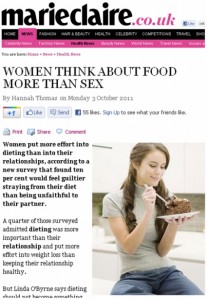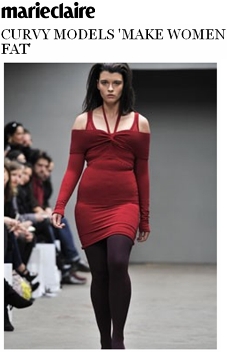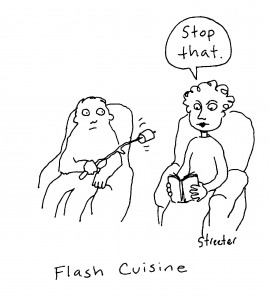Trick or…
treat?!
[Source: Pinup Babes]
It’s Halloween and I’ve got a treat for you. It’s called Intimina, a new line of feminine wellbeing products and information manufactured by the company responsible LELO. If you are unfamiliar with LELO, well, it’s time to get familiarized. LELO are intimate designer ‘lifestyle products’ that not only look good but are well designed, long lasting and rechargeable; I generally refer women and men to LELO first when discussions about adult massagers and intimate market items arise. In fact, I was introduced to LELO several years ago and never looked back. And while the price point is higher than what you might be accustomed to when it comes to vibrators, they are well worth the extra investment.
But I digress…
I received an email from an Intimina PR manager several weeks ago, inquiring if I would be interested in checking out their Intimina brand. When I read that they were attached to LELO (the co-founder is married to LELO Founder Filip Sedic), I didn’t hesitate for a second; I was already a major fan of theirs’.
According to the promotional material, “Intimina by LELO is an exciting new brand focused on providing women with the the very highest standard of products to supplement their intimate wellbeing…” Okay, sounds like standard PR jargon, right? However, I am very impressed by their product offerings, which range from unique Kegel exercisers to maintain and strengthen the pelvic floor to feminine moisturizers to their famous massagers (rebranded in pink, which admittedly, I am not crazy about but if the shoe fits…).
Most of you probably know that Kegel exercise is repetitive contracting and relaxing of the pelvic floor muscles (the vagina and ligaments that support the bladder) in order improve tone and strength, treat or prevent prolapse and stress urinary incontinence. The latter condition, which describes involuntary leakage of urine because the the muscles supporting the urethra don’t shut as tightly as they should, disproportionately affects women, increases with age, and often occurs after pregnancy. It is prompted by activity such as coughing, sneezing and heavy lifting – anything that places pressure on the bladder. Currently, as many as 15 million women in the US are affected by stress urinary incontinence, and with age, it may occur concurrently with overactive bladder, a condition associated with an uncontrolled urge to urinate, frequency of urination, incontinence and nighttime awakening to urinate.
Having never given birth, I’ve not given much thought to strengthening my pelvic floor muscles. However, I know many women who suffer from stress urinary incontinence. Consequently, I am going to try out the Intimina Kegel Exercisers and report back.
My treat. No trick!
Happy Halloween and stay tuned…
p.s. Treat yourself to a LELO product while you await the Intimina review. 0 fat, 0 calories, 100% pleasure.
Disclaimer: Intimina/LELO did not ask me to write about their product nor did they pay me to do so. They provided me with a free sample of the Kegel Exercisers, the Feminine Moisturizer and some background materials. I intend to give them a test drive simply because stress urinary incontinence is a huge problem in women, as is vaginal dryness as women age.
Read More
Just chew your [fill in the blank] away…with Zoft
[Photo does not depict actual product]
No! It really works! And it’s as easy as chewing gum.”
“What’s that,” you ask?
Now you can just chew the menopause [blues/anxiety/hot flashes, mood swings, night sweats, heart palpitations, urinary problems AND vaginal dryness] away! Wow – who knew it was so simple? In fact, Zoft ® Balance Gum (previously called Zoft Menopause Gum) will cure what ails you in just weeks if not days, with the added benefit of fighting dental decay, improving concentration AND fighting bad breath.
Zoft balance is a unique blend of Dong Quai Root, Black Cohosh Root Extract, Damiana Leaf, and Mexican Wild Yam Root, harnessing the power of indigenous knowledge to fight menopausal symptoms. Moreover, this breakthrough has been featured on ‘The View’ not once, but TWICE, which of course, provides an authoritative testimonial as to its efficacy.
Wait! There’s more….the company also offers Fulfill gum (pun intended???) to enlarge your breasts WITHOUT surgery, and Slim gum to help you get back into that size 4 pair of jeans. And just in case your partner feels left out, the company manufactures Relax gum to take that stress out of his or her life.
One-stop shopping for all that ails. Chew on that, won’t you?
Read More
Wednesday Bubble: Should Fatties Get a Room…and Other ‘Fine’ Assaults on Women… Guest Post by Dr. Brian Hughes
My friend Dr. Brian Hughes is at it again. “At what,” you ask? At identifying media assaults on women, on aging and on identities. You may recall that I ran Brian’s piece on ageism back in July of this year. And I am honored to run another post. Once again, I hope that you’ll show Brian some love and spread the word, not only about the post but also his work on The Science Bit Blog. Many thanks Brian!
I don’t know much about Marie Claire, but it appears to be some sort of magazine/website for people who hate women. At least, that’s the conclusion I drew from reading this story in their UK edition’s Health News section: “Women Think About Food More Than Sex“. In genre terms, this is something of a high concept piece, one of those articles that sums up everything it has to offer within the phrasing of its title alone (a bit like “Snakes on a Plane“).
So what did they find? Firstly, a full 25% of women ”admitted” that dieting was more important to them than their intimate relationships. In fact, get this:
…ten per cent would feel guiltier straying from their diet than being unfaithful to their partner.
That’s right. Marital (or relationship) infidelity — the stuff of epic romantic drama at least since the mythology of the ancient Greeks — is actually not that significant after all. What matters more is diet adherence. So, while Hester Prynne appeared somewhat perturbed throughout The Scarlet Letter, at least all she had to deal with was the stigma of her sexual indiscretion. Imagine if the townsfolk found out about that extra chocolate biscuit she used to scoff during coffee breaks…
Here are some more findings:
The most common reason for women in the UK to start a diet is to get the perfect beach body–while one in seven say cruel taunts are the reason they reign [sic] in their eating.
So women become self-conscious about their bodies due to beach paranoia andtaunting, eh? Well I guess that has nothing at all to do with articles appearing in magazines. Magazines like Marie Claire, for example…
How about these delightful pieces: “Are Leggings Making You Fat?“; “Could Your Fridge Be Making You Fat?“; “Curvy Models ‘Make Women Fat’“; “Diets That Make You Fat“; “Healthy Foods That Make You Fat“; “Is Your Air Conditioner Making You Fat?“; “Can A Common Virus Really Make You Fat?“; “3 Surprising Things That Make You Fat” (stilettos, your partner’s education, and boredom, apparently); “3 Fats That Make You Skinny” (ooh-er, now I’m confused); “10 Best Celebrity Beach Bodies“; ”From Flab To Fab: Your Holiday Survival Guide“; and “Get A Beach Body Fast“.
Uh huh. No grounds for paranoia or for beach-body neurosis there at all.
And as for cruel taunts, how about this memorable Marie Claire column called ”Should ‘Fatties’ Get A Room?“ Here’s an excerpt:
So anyway yes, I think I’d be grossed out if I had to watch two characters with rolls and rolls of fat kissing each other…because I’d be grossed out if I had to watch them doing anything. To be brutally honest, even in real life, I find it aesthetically displeasing to watch a very, very fat person simply walk across a room…
I think I understand why “one in seven (UK) women” modify their eating due to “cruel taunts“. They are obviously Marie Claire readers.
Still, while all that looks pretty terrible and offensive, at least Marie Claire quote a nutritionist to advise readers that “Dieting should never become an obsession“. So that’s alright then. Hands washed.
As it happens, “women think about food more than sex” is a well phrased, nicely falsifiable hypothesis. Either it is true or it is not. All that we need is data from a sample of women that is both large and statistically representative of the general population, regarding (a) the extent to which they think about food and (b) the extent to which they think about sex. Then we can do a simple statistical test tocompare these two values in order to determine which subject, on average, is thought about the most.
But of course, that’s not what we get here. Instead we have a pretty standard population-based survey study, with minimalist description of methodological details. Marie Claire report the findings as “Health News“, presenting statistical factoids that imply a basis in a comprehensive dataset but avoiding anything as troublesome as even a sample size.
In fact, according to the UK Press Association, the study examined responses from over 1,200 women, which sounds comprehensive enough. However, we are not told what questions were asked or what other findings the researchers discovered. This is because the study is not actually a piece of formal science. Rather, it’s a bog standard market research survey conducted by a private company who have a commercially vested interest in reporting particular results.
The survey is brought to us by Atkins, the people who make a profit every time a woman buys one of their dieting products. They seem to churn out lots of this type of research (see here, here, and here), all of which goes directly to newswires and yields findings that encourage women to turn dieting into an obsession. And thatnutritionist that Marie Claire get to warn women not to turn dieting into an obsession? Yeah, well she works for Atkins. In fact, she’s their “Chief Nutritionist“.
 Guess which one of these corporate value statements is my favourite
Guess which one of these corporate value statements is my favouriteWe’ve been here before. Pseudoscience in the service of corporate greed is depressing enough on its own. But it is truly amazing how women’s magazines and media outlets become complicit in this baloney. Instead of providing a service that is of actual benefit to women, these magazines end up assisting a corporate marketing strategy designed to maximize profits by generating and exploiting reader confusion.
Hey, for all I know (and I don’t), women might well think more about food than about sex. But let’s just remember this. Women’s magazines think more about their profitable relationships with corporate advertisers than about the edification — or mental health — of their readers.
Yeah! Go women!
About the author…
Dr Brian Hughes is a lecturer in Psychology at the National University of Ireland, Galway and author of Conceptual and Historical Issues in Psychology (Prentice Hall, 2011). When he is not writing or lecturing, you can find him lending his views on Twitter.
Read MoreShe works harder for the money
Awhile back, I wrote a post about how menopause impacts our occupational health and the need for greater awareness among managers of the types of health challenges that their middle aged female employees might be going through. This issue is evidently an ongoing hot button, as it has popped up again in a study that is current online at the Menopause journal site.
There are several conditions that affect work participation and demands, including menopause. And although there is some indication that abseenteeism is highest among women 45 years and older compared to their male contemporaries, the reasons have not been entirely elucidated. By gaining a better understanding of the factors that influence the balance between resources and work demands, there may be a greater openness to understanding and managing expectations by both the employee and the employer.
To explore this further, and using two scientific scales as a foundation, researchers looked into the severity and frequency of psychological, somatic, vasomotor and sexual symptoms and their potential impact on physical and mental work demands, health status and resources in208 women between the ages of 44 and 6o Additionally, they evaluated individual and lifestyle factors that might skew results, as it has been shown previously that among both men and women, lower education, older age, overweight, smoking and lack of exercise all negatively affected work ability.
The result? there was a negative and significant association between menopausal symptoms and work ability. Moreover, even after theyadjusted for some of the factors mentioned above, they found total work ability scores declined by almost a half a point for every one point on the total symptoms scale score. Mental health played a huge role as did somatic symptoms such as sleep disturbances, insomnia, joint pain or mood swings.
If these findings are extrapolated to real world situations, workplace interventions such as yoga breaks, exercise and stress reduction strategies, coupled with a self awareness of overall health and how symptoms detract from that (or not) are simple first steps towards finding a solution and improving work ability. The other piece of this, however, i.e. to openly communicate to our work colleagues, our managers, our partners and our friends how productivity and our relationships may be suffering and actively involve them in finding solutions, might not be so simple.
Often, one of first thing that’s pulled out of the aging hat is the fear that an employee is easily replaced. This has never been truer than in today’s economic environment where the numbers of willing and able workers are stacked against those who are holding onto their jobs by a string and a prayer. As a menopausal woman, do you really want to hand your employer a reason to replace you? I’m betting that the answer is no. Consequently, I am unclear about the best strategy for finding the elusive balance between work ability, resources and symptoms.
Any thoughts or ideas? I’d love to hear them. Let’s get a dialogue going, particularly if you are working harder for the money because of symptoms.
Read More










